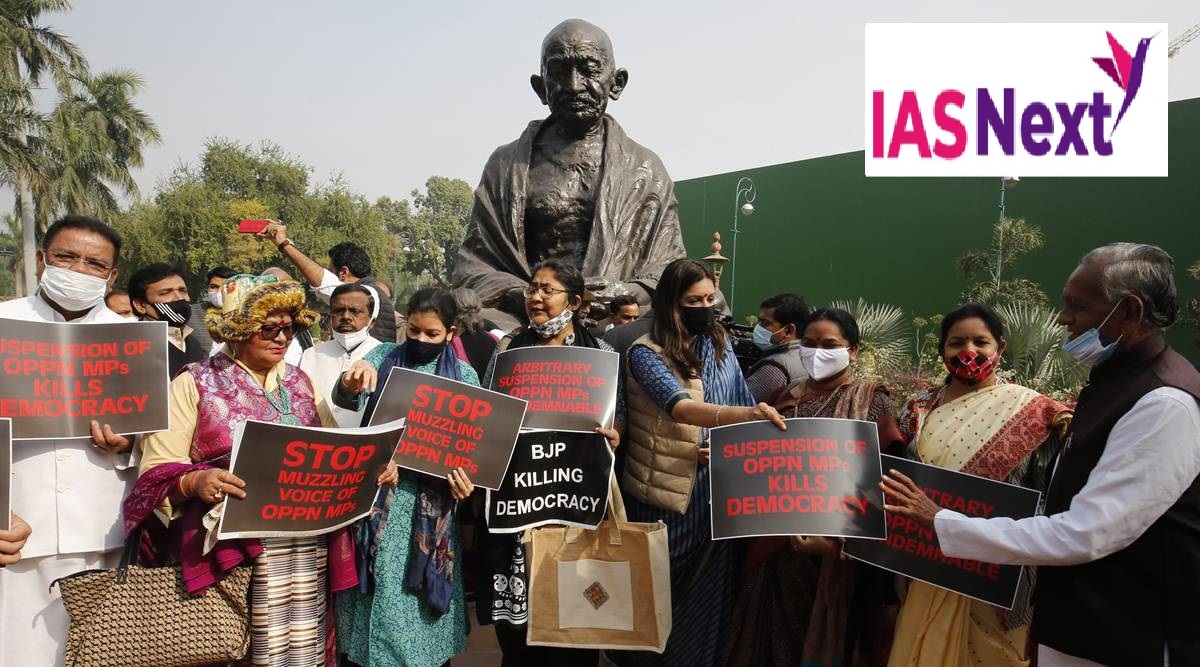CURRENT AFFAIRS
Get the most updated and recent current affair content on Padhaikaro.com
Suspension of MPs
- IAS NEXT, Lucknow
- 01, Dec 2021

Reference News:
Minister for Parliamentary Affairs Prahlad Joshi sought the approval of the House for suspending 12 Rajya Sabha MPs for the remainder of the session.
- The reason for their suspension was “their unprecedented acts of misconduct, contemptuous, unruly and violent behaviour and intentional attacks on security personnel” on the last day of the Monsoon Session.
When can the presiding officer invoke suspension?
Rule 255 of the General Rules of Procedure of the Rajya Sabha.
- Under Rule 255 (‘Withdrawal of member’) of the General Rules of Procedure of the Rajya Sabha, “The Chairman may direct any member whose conduct is in his opinion grossly disorderly to withdraw immediately from the Council and any member so ordered to withdraw shall do so forthwith and shall absent himself during the remainder of the day’s meeting.”
How is suspension under Rule 255 different from Suspension under Rule 256?
Rule 256 provides for ‘Suspension of Member’; whereas Rule 255 provides for lesser punishment.
- Under Rule 256, “the Chairman may, if he deems it necessary, suspend a member from the service of the Council for a period not exceeding the remainder of the Session.
Rules of parliamentary etiquette:
MPs are required to adhere to certain rules of parliamentary etiquette.
- For example the Lok Sabha rulebook specifies that MPs are not to interrupt the speech of others, maintain silence and not obstruct proceedings by hissing or making running commentaries during debates.
Newer forms of protest led to these rules being updated in 1989.
- Now, members should not shout slogans, display placards, tear up documents in protest, and play a cassette or a tape recorder in the House.
Rajya Sabha has similar rules. To conduct the proceedings smoothly, the rulebook also gives certain, similar powers to the presiding officers of both Houses.
Differences in powers of Speaker and Chairman of Rajya Sabha:
- Like the Speaker in Lok Sabha, the Chairman of Rajya Sabha is empowered under Rule Number 255 of its Rule Book to “direct any Member whose conduct is in his opinion grossly disorderly to withdraw immediately” from the House.
- Unlike the Speaker, however, the Rajya Sabha Chairman does not have the power to suspend a Member.
Procedure to be followed for suspension of Rajya Sabha MPs:
- The Chairman may “name a Member who disregards the authority of the Chair or abuses the rules of the Council by persistently and wilfully obstructing” business.
- In such a situation, the House may adopt a motion suspending the Member from the service of the House for a period not exceeding the remainder of the session.
- The House may, however, by another motion, terminate the suspension.
Efforts to bring order in the House:
As Chairman of Rajya Sabha, Vice-President Ansari had attempted several steps to bring order to the House. In 2013, he mooted a number of radical solutions to maintain decorum. This included:
- Naming and shaming MPs in the Rajya Sabha bulletin for stepping outside House rules.
- Those named were to include members who came into the Well, or indulged in other grossly disorderly behaviour.
- The telecast of proceedings to be deferred to prevent visuals of disorder from being made public.
How can suspension of MPs be justified? Isn’t this an extreme step to take in order to curb unruly behaviour?
The solution to unruly behaviour has to be long-term and consistent with democratic values.
- There can be no question that the enforcement of the supreme authority of the Presiding Officer is essential for smooth conduct of proceedings.
- However, a balance has to be struck. It must be remembered that the job of the Presiding Officer is to run the House, not to lord over it.
How often have disruptions led to suspension of MPs?
- The first instance occurred in 1963. A few Lok Sabha MPs first interrupted President Sarvapalli Radhakrishnan and then walked out while he was delivering the joint address to both Houses.
- Lok Sabha ended in reprimanding these MPs. In 1989, 63 MPs were suspended from Lok Sabha on the discussion of the Thakar Commission report.
- More recently in 2010, 7 MPs were suspended from Rajya Sabha for snatching the women’s reservation bill from the minister.
Since then, MPs have raised slogans, used pepper spray in the House and displayed placards.